You are the stars and the world is watching you. By your presence, you send a message to every village, every city, every nation. A message of hope. A message of victory (Eunice Kennedy Shriver).
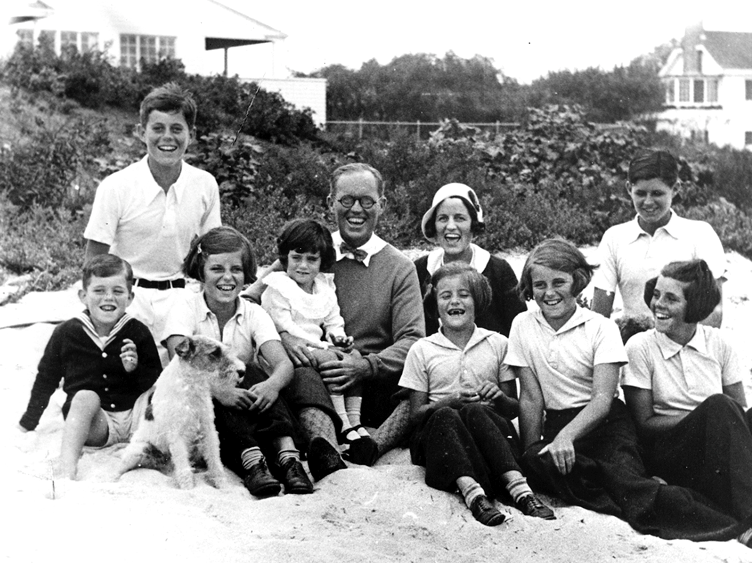 Shriver and her well-known familymadisonhouseautism.orgMahatma Gandhi said, “The best way to find yourself is to lose yourself in the service of others” (Forbes). Eunice Kennedy Shriver lived her life by this principle. She fiercely believed that those who truly care for other people will live a happier more fulfilled life themselves. Shriver used her vast amount of resources; political, social, and financial to make a lasting difference in our world today. Shriver had this opportunity to make changes because she was born into the very powerful and influential Kennedy family. She was born on July 10, 1921 in Brookline, Massachusetts to Joseph and Rose Kennedy (“Eunice Kennedy Shriver”). Shriver was the fifth of nine Kennedy children born into a “into a family of wealthy, attractive overachievers whose athletic pursuits sharpened the competitive streak their parents encouraged” (“Eunice Kennedy Shriver.” Newsmakers). Her family’s powerful influence could be seen when she wed the love of her life, Robert Sargent Shriver Jr. They were married at the prestigious St. Patrick’s Cathedral in New York City with 1,700 guests in attendance (“Eunice Kennedy Shriver.” Newsmakers). This family’s political power escalated dramatically when her brother, John F. Kennedy, became President of the United States in 1960. It was during the time that John F. Kennedy was President that Shriver had the opportunity to make long lasting changes for people with disabilities. (“Shriver, Eunice Kennedy”). This passion stemmed from the love she had for her sister Rosemary. “Rosemary was born mentally disabled in 1918 and, after undergoing a botched lobotomy at age 23, was hidden from public view and cared for by nuns in a Wisconsin Catholic institution until her death in 2005 at age 86” (“Shriver, Eunice Kennedy”). Rosemary’s mental and physical disabilities inspired Eunice to fight for the disabled and help them have the same experiences other children and adults have. Her love for her sister inspired her to create the Special Olympics. It first started as a “summer camp for developmentally disabled children at her Maryland home in the early 1960s. By 1968, her idea had expanded to become the First International Special Olympics Summer Games, where attendees from 26 states and Canada competed in track and field events and swimming” (“Eunice Kennedy Shriver.” Newsmakers). The Special Olympics changed the world for disabled children and their parents by providing them with an opportunity to compete and be with others in their situation. She took something that was hidden and brought it to the light. She is considered a hero amongst so many people in and out of the disabled community because of her great determination, strength (both mental and physical), love, and acceptance she had for all people. Eunice Kennedy Shriver changed the world for the better, because she dedicated her life to improving the lives of the mentally and physically handicapped through her powerful influence and fearlessness in fighting for equal rights for every person.
Shriver and her well-known familymadisonhouseautism.orgMahatma Gandhi said, “The best way to find yourself is to lose yourself in the service of others” (Forbes). Eunice Kennedy Shriver lived her life by this principle. She fiercely believed that those who truly care for other people will live a happier more fulfilled life themselves. Shriver used her vast amount of resources; political, social, and financial to make a lasting difference in our world today. Shriver had this opportunity to make changes because she was born into the very powerful and influential Kennedy family. She was born on July 10, 1921 in Brookline, Massachusetts to Joseph and Rose Kennedy (“Eunice Kennedy Shriver”). Shriver was the fifth of nine Kennedy children born into a “into a family of wealthy, attractive overachievers whose athletic pursuits sharpened the competitive streak their parents encouraged” (“Eunice Kennedy Shriver.” Newsmakers). Her family’s powerful influence could be seen when she wed the love of her life, Robert Sargent Shriver Jr. They were married at the prestigious St. Patrick’s Cathedral in New York City with 1,700 guests in attendance (“Eunice Kennedy Shriver.” Newsmakers). This family’s political power escalated dramatically when her brother, John F. Kennedy, became President of the United States in 1960. It was during the time that John F. Kennedy was President that Shriver had the opportunity to make long lasting changes for people with disabilities. (“Shriver, Eunice Kennedy”). This passion stemmed from the love she had for her sister Rosemary. “Rosemary was born mentally disabled in 1918 and, after undergoing a botched lobotomy at age 23, was hidden from public view and cared for by nuns in a Wisconsin Catholic institution until her death in 2005 at age 86” (“Shriver, Eunice Kennedy”). Rosemary’s mental and physical disabilities inspired Eunice to fight for the disabled and help them have the same experiences other children and adults have. Her love for her sister inspired her to create the Special Olympics. It first started as a “summer camp for developmentally disabled children at her Maryland home in the early 1960s. By 1968, her idea had expanded to become the First International Special Olympics Summer Games, where attendees from 26 states and Canada competed in track and field events and swimming” (“Eunice Kennedy Shriver.” Newsmakers). The Special Olympics changed the world for disabled children and their parents by providing them with an opportunity to compete and be with others in their situation. She took something that was hidden and brought it to the light. She is considered a hero amongst so many people in and out of the disabled community because of her great determination, strength (both mental and physical), love, and acceptance she had for all people. Eunice Kennedy Shriver changed the world for the better, because she dedicated her life to improving the lives of the mentally and physically handicapped through her powerful influence and fearlessness in fighting for equal rights for every person.
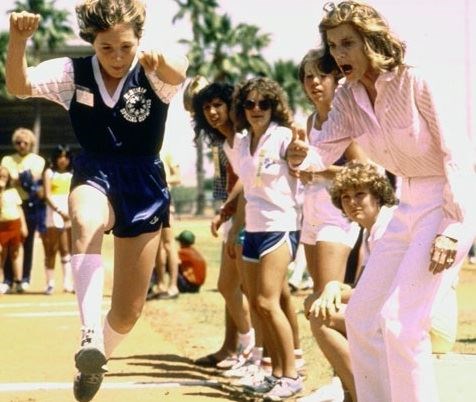 Shriver cheering on a Special Olympiangetreligion.orgEunice Kennedy Shriver was so dedicated to making a change in the world, for the mentally disabled, that she put their lives before her own. Shiver’s dedication and passion towards her athletes was evident. Jack McCallum, writer for Sports Illustrated wrote, “One of the first things Mrs. Shriver ever told me after we met,’ says 56-year-old Loretta Claiborne, one of the most celebrated Special Olympics athletes, was that she was going to come out and watch me run. She took the sports seriously and looked on us as athletes. That's important” (McCallum, “Eunice”). Shriver was dedicated to her athletes and always excited to go watch them participate and succeed. She looked at her special athletes as real competitors and treated them that way. Her dedication could be seen by in the way she was involved in every detail. In the article, “Eunice Kennedy Shriver”, it describes her dedication to the disabled, “She worked tirelessly to improve the quality of life for mentally challenged people and to provide them with opportunities to achieve, to become productive citizens, and to be respected members of their communities¨ (Eunice Kennedy Shriver). She believed passionately that the mentally disabled deserved a much better life than they were receiving in the early 60’s. Shriver stood firm in her belief that everyone deserves to be treated equally. Her undying dedication to improving the lives of the disabled led her to change the world through her creation of the Special Olympics.
Shriver cheering on a Special Olympiangetreligion.orgEunice Kennedy Shriver was so dedicated to making a change in the world, for the mentally disabled, that she put their lives before her own. Shiver’s dedication and passion towards her athletes was evident. Jack McCallum, writer for Sports Illustrated wrote, “One of the first things Mrs. Shriver ever told me after we met,’ says 56-year-old Loretta Claiborne, one of the most celebrated Special Olympics athletes, was that she was going to come out and watch me run. She took the sports seriously and looked on us as athletes. That's important” (McCallum, “Eunice”). Shriver was dedicated to her athletes and always excited to go watch them participate and succeed. She looked at her special athletes as real competitors and treated them that way. Her dedication could be seen by in the way she was involved in every detail. In the article, “Eunice Kennedy Shriver”, it describes her dedication to the disabled, “She worked tirelessly to improve the quality of life for mentally challenged people and to provide them with opportunities to achieve, to become productive citizens, and to be respected members of their communities¨ (Eunice Kennedy Shriver). She believed passionately that the mentally disabled deserved a much better life than they were receiving in the early 60’s. Shriver stood firm in her belief that everyone deserves to be treated equally. Her undying dedication to improving the lives of the disabled led her to change the world through her creation of the Special Olympics.
Eunice Kennedy Shriver had such a large influence on the world because she cared for the mentally and physically disabled when no one else did. She was also a powerful influence because she gave a voice for those who did not have a voice. In the article, "Eunice Kennedy Shriver", Shiver’s influence is not only seen in the community but was also evident in her marriage and family when it states, “Shriver married R. Sargent Shriver, founder of the Peace Corps and U.S. ambassador to France. He shared her religious views as well as her sense of social responsibility and commitment to helping mentally challenged people. Shiver's brother, President John F. Kennedy, also had a vision of helping mentally challenged people and their families” (“Eunice Kennedy Shriver”). Eunice influenced many people including her husband, and her brother, John F. Kennedy to take a more active role in her social movement. Her influence on these powerful political people led to her work having a greater impact on the world. Jack McCallum also describes the great achievements of Shriver, “Eunice received SI's first Sportsman of the Year Legacy Award last December, recognizing her as the founder of Special Olympics and the single most important person to have advanced the rights and enriched the lives of people with intellectual disabilities”(McCallum, Eunice). Shriver left behind a huge legacy, of always being devoted to one’s beliefs and never giving up when life gets hard. She was forever a competitor which could be seen in her unfailing devotion to her work. Shriver would be described today as a power influencer. She left a huge mark on the world, she taught people through example how to treat everyone with kindness and equality. She was a human rights activist by every definition.
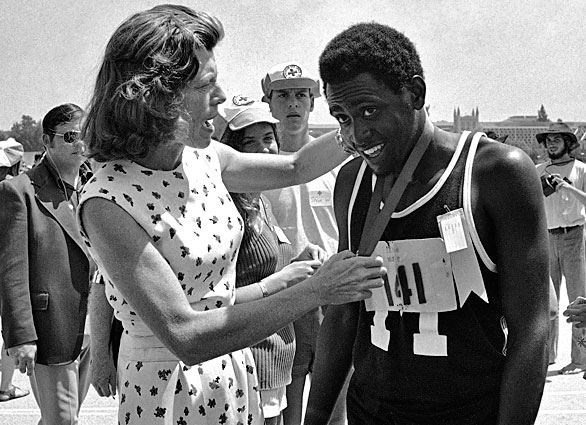 Shriver showing that she saw everyone as an equaljfkhyannismuseum.orgEunice Kennedy Shriver was fearless in fighting for equal rights for every person, especially those who were overlooked and silenced. She did not care what the world thought of her because she passionately believed that she was doing the right thing. She was the advocate that the mentally and physically disabled desperately needed. In the article, "Eunice Kennedy Shriver", it shows Shiver’s determination when she first started the Special Olympics in June 1963, “Shriver and her husband began a summer day camp at Timberlawn, the Rockville, Maryland home that they rented...50 to 60 mentally challenged children and adults came to Camp Timberlawn” (“Eunice Kennedy Shriver”). Shiver’s determination led to her small summer camp developing into the large Special Olympics we know today. She was passionate about making this event happen, because of her undying belief that these people should have the same opportunities to feel competition and the winning spirit. Shriver showed great fearlessness in fighting for the disabled’s equal rights because during this time the mentally disabled were viewed as a burden or as “village idiots” who were treated with terrible disregard (McNamara 142). Eunice stood up for them with no thought of what the world would think of her and the damage it could do to her highly regarded reputation. Her fearlessness to be an advocate for this mistreated population was a powerful example to others of how we should treat all people with respect. Jack McCallum shows Shiver’s fearlessness in her quote, ¨Let me win, but if I cannot win, let me be brave in the attempt¨ (McCallum, Small). Eunice’s fearlessness and bravery changed the world forever. She inspired others to try their best and if that failure was ok as long as their best effort was made. Shriver wanted all of her athletes to be brave and to give their all during the Special Olympics. This competitive spirit was deeply bred in her from her own upbringing. This competitive nature made her a fearless fighter for the mentally disabled to have their own sporting events. This fearlessness sometimes even turned to anger for the lack of empathy that people had towards this population. McNamara states that Shriver had “rage at the lack of respect for life in a society more focused on personal fulfillment than communal responsibility. Rage at the inability, or unwillingness, of government to deliver on America’s promise of equality for all its citizens, no matter how diminished their capacities” (McNamara 24). Shriver had great fearlessness because she stood up for the mentally disabled when no one cared about them and their rights. Her passion for human rights was so fierce that she dedicated her life’s work to the mentally disabled, so they could feel joy through experiencing more fulfilling lives.
Shriver showing that she saw everyone as an equaljfkhyannismuseum.orgEunice Kennedy Shriver was fearless in fighting for equal rights for every person, especially those who were overlooked and silenced. She did not care what the world thought of her because she passionately believed that she was doing the right thing. She was the advocate that the mentally and physically disabled desperately needed. In the article, "Eunice Kennedy Shriver", it shows Shiver’s determination when she first started the Special Olympics in June 1963, “Shriver and her husband began a summer day camp at Timberlawn, the Rockville, Maryland home that they rented...50 to 60 mentally challenged children and adults came to Camp Timberlawn” (“Eunice Kennedy Shriver”). Shiver’s determination led to her small summer camp developing into the large Special Olympics we know today. She was passionate about making this event happen, because of her undying belief that these people should have the same opportunities to feel competition and the winning spirit. Shriver showed great fearlessness in fighting for the disabled’s equal rights because during this time the mentally disabled were viewed as a burden or as “village idiots” who were treated with terrible disregard (McNamara 142). Eunice stood up for them with no thought of what the world would think of her and the damage it could do to her highly regarded reputation. Her fearlessness to be an advocate for this mistreated population was a powerful example to others of how we should treat all people with respect. Jack McCallum shows Shiver’s fearlessness in her quote, ¨Let me win, but if I cannot win, let me be brave in the attempt¨ (McCallum, Small). Eunice’s fearlessness and bravery changed the world forever. She inspired others to try their best and if that failure was ok as long as their best effort was made. Shriver wanted all of her athletes to be brave and to give their all during the Special Olympics. This competitive spirit was deeply bred in her from her own upbringing. This competitive nature made her a fearless fighter for the mentally disabled to have their own sporting events. This fearlessness sometimes even turned to anger for the lack of empathy that people had towards this population. McNamara states that Shriver had “rage at the lack of respect for life in a society more focused on personal fulfillment than communal responsibility. Rage at the inability, or unwillingness, of government to deliver on America’s promise of equality for all its citizens, no matter how diminished their capacities” (McNamara 24). Shriver had great fearlessness because she stood up for the mentally disabled when no one cared about them and their rights. Her passion for human rights was so fierce that she dedicated her life’s work to the mentally disabled, so they could feel joy through experiencing more fulfilling lives.
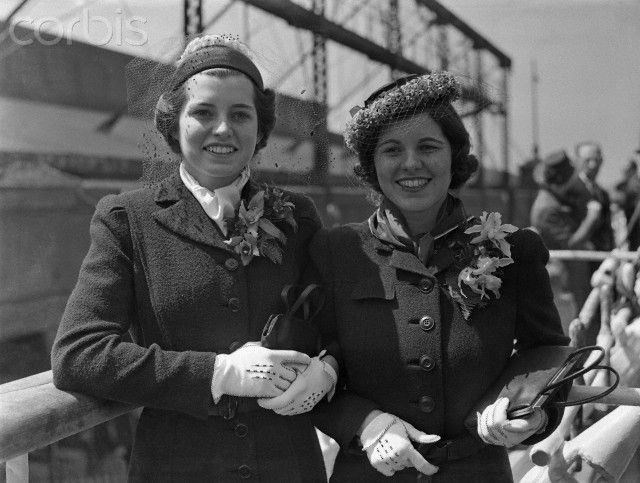 Shriver and her sister, Rosemarypinterest.comEunice Kennedy Shriver changed the world forever, especially for those who were mentally or physically disabled. Her dedication to them enriched their lives. Her influence and fearlessness caused a cultural mind shift in how people viewed the disabled. Eileen McNamara author of the book, Eunice, speaks about the magnitude of Eunice’s impact as she states, “Eunice Kennedy Shriver is the reason we no longer lock away children and adults with intellectual disabilities - that we educate them, employ them, and help them thrive” (McNamara 24). People stopped seeing them as invisible, a hindrance, and helpless, and started seeing them as individuals who have dreams and are capable of accomplishing their goals. They were one of the last minority groups to be given the same equal rights as other groups. The difference was that this group was not able to fight for themselves, but they had Eunice Kennedy Shriver as their passionate advocate. Eileen McNamara agrees when she states, ”Her genius was not in getting there first. It was in finding and promoting the best ideas and carrying them out on a grand scale. She used the Kennedy name to kick open doors all over the world, and for more than forty years, she barged through them, hectoring, demanding, and working harder than anyone in the room to get done what others said could not be done” (McNamara 23). Her persistence and determination to not let any barrier stop her from achieving her goal for a better quality of life for the disabled is simply inspiring to me. Her courage and determination inspires me to be a better, kinder person who looks out for those in my community who might be not being treated respectfully. She didn't care what others thought about her; she only cared about fighting for those who didn't have a voice. McNamara also speaks about the impact Shriver had on the world, “Eunice Kennedy Shriver is the reason we no longer lock away children and adults with intellectual disabilities - that we educate them, employ them, and help the thrive” (McNamara 24). Shiver’s impact on the mentally disabled community can not be measured. She is an inspiration to me and others who are fighting for a cause they are passionate about. She forever changed how people view those with disabilities, which in turn changed the quality of their lives forever by allowing them to be treated as equals. McNamara quotes Shiver’s inspiring message, “Love gave me confidence, and adversity gave me purpose” (McNamara 298). This shows the level of her passion and determination she had that drove her forty year fight for equal rights for all. She had an undying belief that she could make a positive difference for people whose needs had not been heard or considered. This gives Shriver all the qualities of a hero, more specifically my hero. Eunice Kennedy Shriver was an inspiration to everyone around her because even in her golden years she continued to work hard and fight for this vulnerable population. Her work ethic and passion for change is heroic to me. Learning about her makes me want to be better, to be kinder, and to fearlessly pursue what I know to be right.
Shriver and her sister, Rosemarypinterest.comEunice Kennedy Shriver changed the world forever, especially for those who were mentally or physically disabled. Her dedication to them enriched their lives. Her influence and fearlessness caused a cultural mind shift in how people viewed the disabled. Eileen McNamara author of the book, Eunice, speaks about the magnitude of Eunice’s impact as she states, “Eunice Kennedy Shriver is the reason we no longer lock away children and adults with intellectual disabilities - that we educate them, employ them, and help them thrive” (McNamara 24). People stopped seeing them as invisible, a hindrance, and helpless, and started seeing them as individuals who have dreams and are capable of accomplishing their goals. They were one of the last minority groups to be given the same equal rights as other groups. The difference was that this group was not able to fight for themselves, but they had Eunice Kennedy Shriver as their passionate advocate. Eileen McNamara agrees when she states, ”Her genius was not in getting there first. It was in finding and promoting the best ideas and carrying them out on a grand scale. She used the Kennedy name to kick open doors all over the world, and for more than forty years, she barged through them, hectoring, demanding, and working harder than anyone in the room to get done what others said could not be done” (McNamara 23). Her persistence and determination to not let any barrier stop her from achieving her goal for a better quality of life for the disabled is simply inspiring to me. Her courage and determination inspires me to be a better, kinder person who looks out for those in my community who might be not being treated respectfully. She didn't care what others thought about her; she only cared about fighting for those who didn't have a voice. McNamara also speaks about the impact Shriver had on the world, “Eunice Kennedy Shriver is the reason we no longer lock away children and adults with intellectual disabilities - that we educate them, employ them, and help the thrive” (McNamara 24). Shiver’s impact on the mentally disabled community can not be measured. She is an inspiration to me and others who are fighting for a cause they are passionate about. She forever changed how people view those with disabilities, which in turn changed the quality of their lives forever by allowing them to be treated as equals. McNamara quotes Shiver’s inspiring message, “Love gave me confidence, and adversity gave me purpose” (McNamara 298). This shows the level of her passion and determination she had that drove her forty year fight for equal rights for all. She had an undying belief that she could make a positive difference for people whose needs had not been heard or considered. This gives Shriver all the qualities of a hero, more specifically my hero. Eunice Kennedy Shriver was an inspiration to everyone around her because even in her golden years she continued to work hard and fight for this vulnerable population. Her work ethic and passion for change is heroic to me. Learning about her makes me want to be better, to be kinder, and to fearlessly pursue what I know to be right.
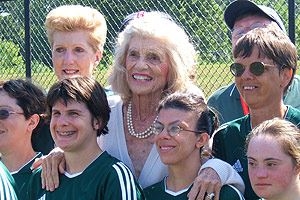 Shriver supporting and caring for some Special Olympiansspecialolympics.org
Shriver supporting and caring for some Special Olympiansspecialolympics.org
Works Cited
"Eunice Kennedy Shriver." Encyclopedia of World Biography, vol. 19, Gale, 1999. Student
Resources In Context, https://link.galegroup.com/apps/doc/K1631007353/SUIC?u=powa9245&sid=SUIC&xid=68264534. Accessed 1 May 2018.
“Eunice Kennedy Shriver." Newsmakers, vol. 1, Gale, 2010. Student Resources In Context,
https://link.galegroup.com/apps/doc/K1618005245/SUIC?u=powa9245&sid=SUIC&xid=351b5eea. Accessed 1 May 2018.
Forbes, Forbes Magazine, www.forbes.com/forbes/welcome/?toURL.
McCallum, Jack. "Eunice Kennedy Shriver." Sports Illustrated, vol. 111, no. 7, 24 Aug. 2009, p.
19. EBSCOhost, search.ebscohost.com/login.aspx?direct=true&db=aph&AN=43792999&site=ehost-live.
Mccallum, Jack. “Small Steps, Great Strides” SI.com, 14 Oct. 2015,
www.si.com/vault/2008/12/08/105760282/small-steps-great-strides.
McNamara, Eileen. Eunice: the Kennedy Who Changed the World. Simon & Schuster, 2018.
"Shriver, Eunice Kennedy (1921–)." Dictionary of Women Worldwide: 25,000 Women Through
the Ages, edited by Anne Commire and Deborah Klezmer,
vol. 2, Yorkin Publications, 2007, p. 1720. Gale Virtual Reference Library,
https://link.galegroup.com/apps/doc/CX2588821518/GVRL?u=powa9245&sid=GVRL&xid=d692c18a. Accessed 1 May 2018.
"The Forgotten Kennedy." People, vol. 82, no. 21, 17 Nov. 2014, pp. 80-83. EBSCOhost,
search.ebscohost.com/login.aspx?direct=true&db=aph&AN=99266484&site=ehost-live.
Page created on 5/21/2018 3:19:18 PM
Last edited 9/2/2021 10:40:06 PM
